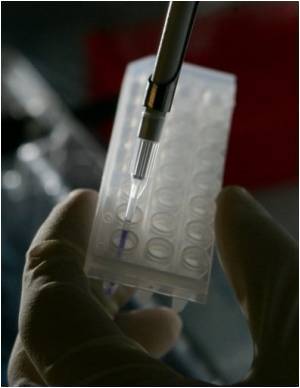Genetic variations that are linked with the onset of Barrett's oesophagus (BE) have been identified for the first time.

Now, a multi-national team of researchers led by Professor Janusz Jankowski of the Blizard Institute of Cell and Molecular Science at Queen Mary, University of London (UK), has identified genetic variations on chromosome 6p21 and on chromosome 16q24. Their research is published online today (Sunday) in Nature Genetics [1].
BE [2] is a condition in which abnormal changes occur in cells lining the lower end of the gullet. It is usually caused by acid reflux and the incidence has been increasing over the past few years, with 10-20 per cent of patients with acid reflux developing BE. It can progress to become Barrett's dysplasia, when the cells become pre-cancerous, and can then develop into oesophageal adenocarcinoma (cancer). Five-year survival following a diagnosis of adenocarcinoma is less than 15 per cent, and so it is important to detect and treat the conditions while they are still in their early stages.
Professor Jankowski and colleagues, from over 100 centres in the UK and 20 more around the world, conducted a genome-wide analysis in which they analysed 660,000 genetic variations in 1,800 patients with BE and tested the top 200,000 genetic variations in another set of 1,105 patients, comparing them with large groups of people (over 5,000 in total), acting as controls, who did not have BE. During this process they identified variations in the sequence of single nucleotides – the molecules, A, T, C or G that make up DNA – in two chromosomes. They then tested these two single nucleotide polymorphisms (SNPs) in a further 4,500 patients.
"After these stages, the two SNPs on chromosomes 6p21 and 16q24 showed compelling evidence that they were associated with the development of Barrett's oesophagus," said Professor Jankowski. "This is the first time a genetic link has been shown. Our findings provide a basis for genetically screening 30 per cent of the Western population who get acid reflux to see which 10 to 20 per cent of them – three per cent of the population overall – will go on to develop BE. These genetic variations will also form the basis for developing new targets for therapy.
"Given that BE is known to be a precursor to oesophageal cancer, it is quite possible that these genetic variations could also be risk factors for developing the cancer and they may give us clues as to the biological mechanisms involved."
Advertisement
"Our results provide direct evidence for a genetic cause for Barrett's oesophagus," said Professor Jankowski. "Although it's not completely clear yet what roles are played by the underlying genes, the location of one of the SNPs near to the gene FOXF1 suggests there may be structural factors in the stomach and oesophagus that predispose a person to develop the condition. This is consistent with evidence that a structural deficit, namely hiatus hernia, is known to be strongly associated with BE. We also found evidence to show that SNPs that are known to be associated with increased body weight were also showing a likely association with BE; this suggests that genetic effects may partly underpin the epidemiological observation that obesity is a risk factor for BE."
Advertisement
The researchers plan to test another 10,000 patients in order to replicate these results and to see if they can find any other genes that can predict who will go on to develop BE.
"We now know that BE can be inherited like Crohn's or coeliac disease. We have shown that it is likely that the body's control of inflammation and subtle changes to repair mechanisms dictate predisposition to the disease. Our findings make it possible to screen people to predict who will progress to develop BE, and enable us to design new drugs to treat the condition. Given that reflux oesophagitis is the commonest medical condition in the Western adult population, affecting one in three people, these finding have a huge potential impact," concluded Professor Jankowski.
BE occurs in about two per cent of the population, with the highest risk among men over 50 years old in developed countries. The risk of developing oesophageal adenocarcinoma among people with BE has been estimated to be approximately 0.4-1 per cent a year. Oesophageal cancer is the eighth most common cancer worldwide with nearly 482,000 new cases diagnosed and about 406,500 deaths each year.
Source-Eurekalert















